by Ray Linville
Do you wish that you could grow the same vegetables that Grandma grew? The flavors that she tasted and the nutrients that she enjoyed are legendary, and many of us reminisce about how we miss the flavors of yesteryear. Because this desire to appreciate traditional foods is growing, a cultural movement to preserve heirloom seeds and plants has slowly but increasingly developed in our state. Efforts in the western counties, in particular, are significant.
To understand this trend, we first have to appreciate the difference between heirloom vegetables and their modern hybrids. Although many heirlooms date back more than 100 years, gardeners typically consider any plant introduced prior to 1951 (the year of the first hybridized plants) to be an heirloom variety. However, some date back centuries to the cultures of American Indians, and others can be traced to ancestral countries in Europe and Africa.
To make growing vegetables less labor-intensive and more reliable, particularly in fighting off diseases, hybrids were developed for large-scale producers as well as family gardeners. Hybrids also enable massive commercial production by increasing yield and making sizes, shapes, and colors more consistent. As a result, hybrids increase the profitability and ease of distribution.
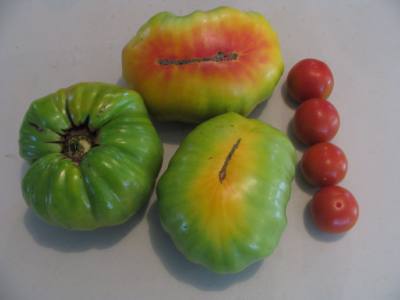
by the Mountain Research Station.
However, maintaining flavor and nutrient value has not always been a major consideration as hybrids have been introduced, which explains the growing interest in heirloom fruits and vegetables. In addition, growing an heirloom is a connection for some gardeners to their heritage, particularly when they assist in saving and exchanging the seeds. Many gardeners as well as consumers consider heirloom vegetables “a taste of the past.”
Seed-saving organizations and seed exchanges offer help for the aspiring gardener. They often differ from a seed company because they encourage garden biodiversity, promote the use of rare heirlooms, and help to record the histories of these seeds. In the past, seeds would have been passed down from one family member to another.
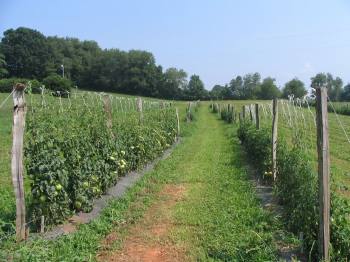
by the Mountain Horticultural Crops Research and Extension Center.
In the western part of the state, from Waynesville to Boone, research scientists, small farms, farmers markets, and retail outlets are expanding our knowledge and appreciation of heirloom seeds and plants. For example, scientists are proving what Grandma knew: Heirlooms taste better. In the tomato study, conducted at the Mountain Research Station in Waynesville, heirloom tomatoes were preferred because their flavors were superior, although some heirlooms have a tendency to crack and have an irregular appearance. In addition, the N.C. Cooperative Extension (a partnership that includes county governments and provides agricultural research of N.C. State University and N.C. A&T State University) is helping small farms in identifying seed sources.
Appalachian Seeds Farm and Nursery, a small family farm in Asheville, produces heirloom tomato seeds and plants and a wide selection of heirloom vegetable plants. In addition to selling its plants to garden centers, it participates in the N.C. Herb Festival. This festival, held the first weekend in each May at the WNC Farmers Market in Asheville, is a showcase for similar heirloom seed producers such as Sow True Seed, which specializes in traditional Southern Appalachian varieties.
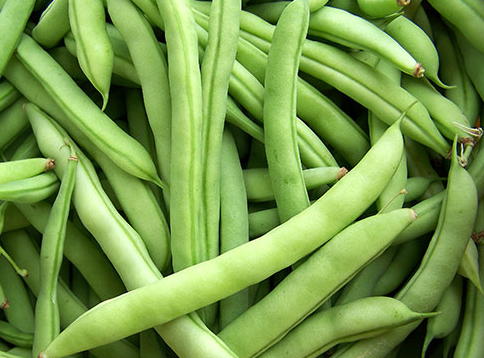
this year in the Sow True Seed catalog.
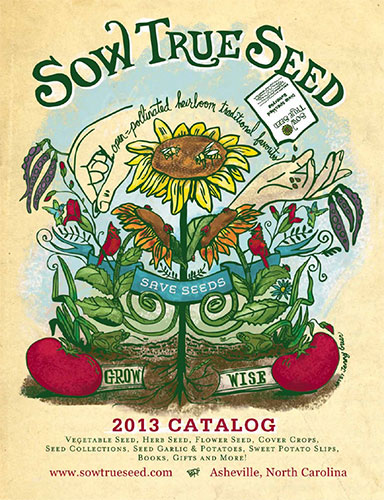
Black Mountain Farmers Market, also in Buncombe County, carries many heirloom varieties, including over 80 types of tomatoes. In addition, it offers seeds provided by the Southern Exposure Seed Exchange (SESE), an enterprise that began in 1982 with the motto, “Saving the past for the future.” SESE carries more than 700 varieties of heirloom vegetable, flower, herb, grain, and cover crop seeds. Although gardeners and farmers can order seeds directly from SESE, these seeds are also available in other N.C. locations, such as in Greensboro (at Deep Roots Market), Kinston (at Living Well Down East), and Raleigh (at Logan’s Trading Co.).
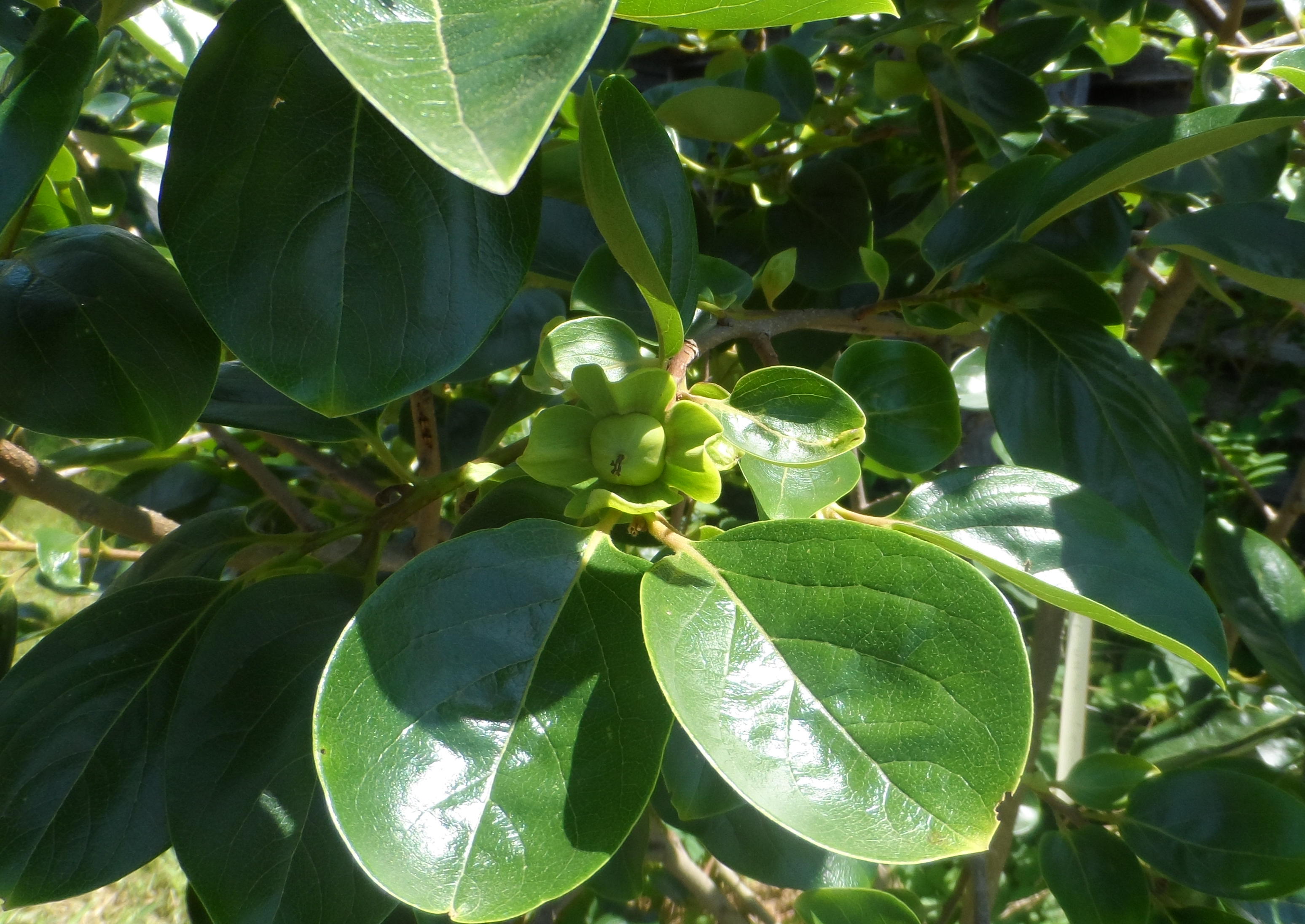
by Southern Exposure Seed Exchange.
When I recently visited the community gardens of Southern Exposure Seed Exchange and met owner Ira Wallace, I learned more about the cultural value that seed exchanges and seed-saving organizations provide. The United Nations Food and Agriculture Organization estimates that heirloom varieties are disappearing at a rate of up to 2% a year.

Visitors to plots of Southern Exposure Seed Exchange listen as
Ira Wallace (center), proprietor, explains the operations.
The effort to preserve and promote heirloom seeds and plants has also expanded to some historical sites. Old Salem, in its merchant and garden shop, in Winston-Salem offers seeds for heirloom tomatoes, beets, pumpkins, mint, and other plants. More significant is its Homowo Harvest Collection (“homowo” is a word from Ghana that means “jeering at hunger”), which is new in 2013 and offers seeds of plants native to Africa and other plants associated with African American foodways. More than 45 heirloom plants grown in America by 1900 comprise this collection, which includes legumes, okra, beans, sorghum, cowpeas, peppers, watermelons, and collards.
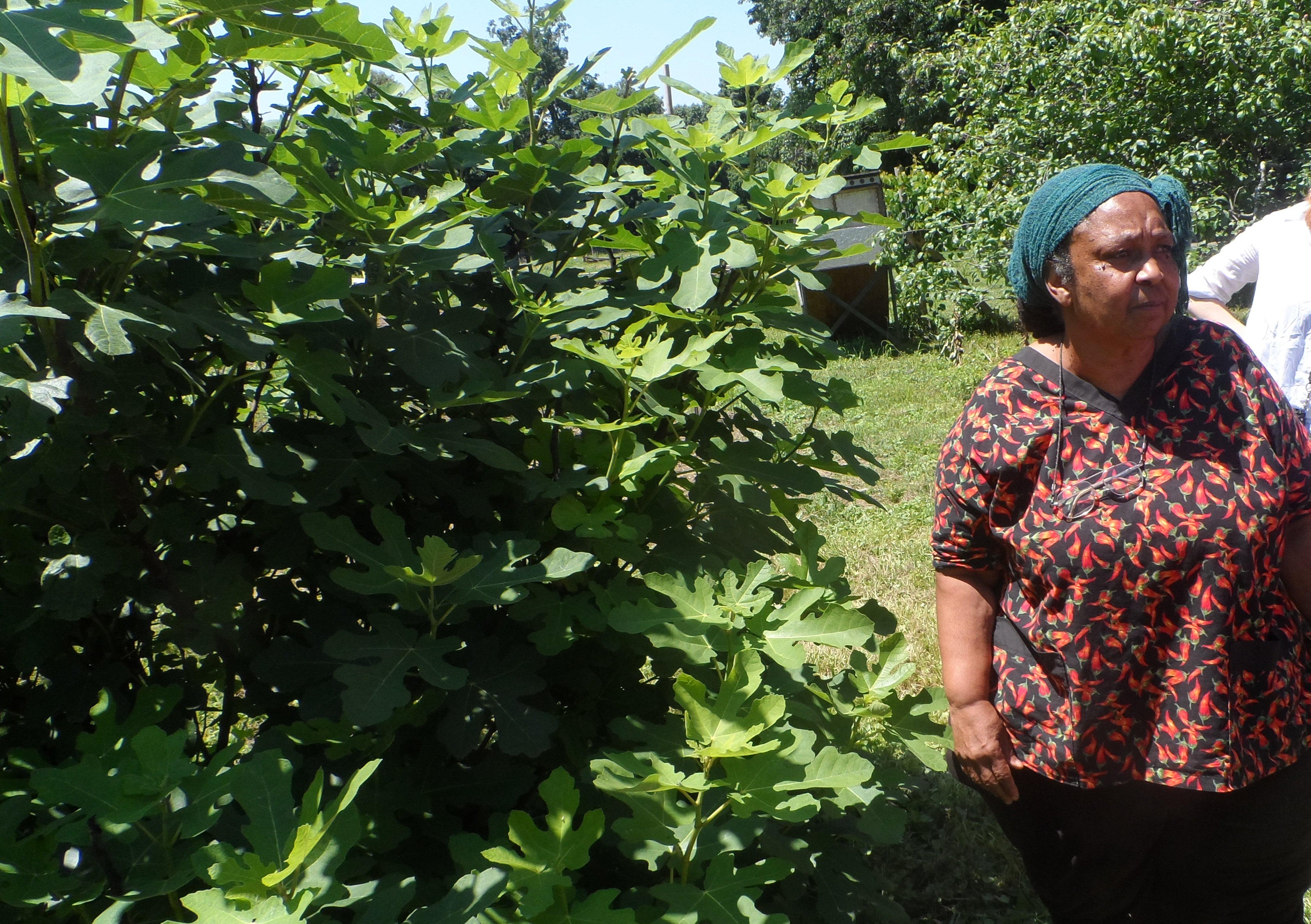
proprietor of Southern Exposure Seed Exchange.
Much like the travelers who enjoy seeing old-fashioned rockers on porches of locations such as Cracker Barrel, we want to experience traditional flavors and nutrients when we eat. Let’s hope the efforts by farmers and businesses in the Southern Appalachian community and elsewhere in the state continue to expand as we become more knowledgeable and discerning about our food choices.
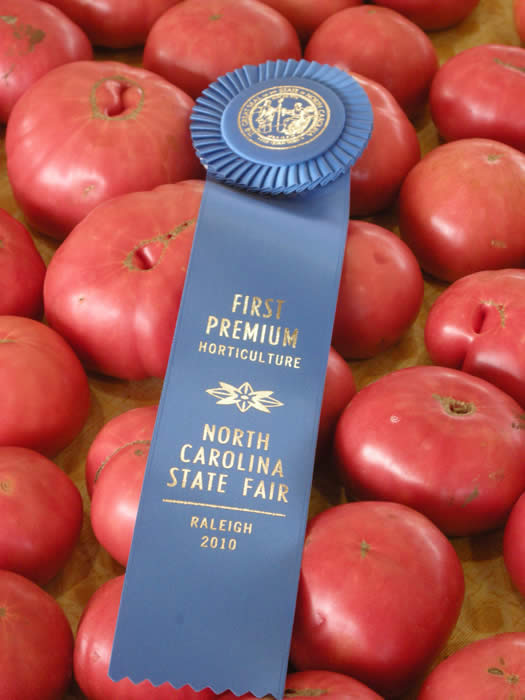
RESOURCES
Appalachian Seeds Farm and Nursery
Homowo Harvest Collection
Mountain Horticultural Crops Research and Extension Center
N.C. Cooperative Extension
N.C. Department of Agriculture and Consumer Services
Saving Our Seeds
Southern Exposure Seed Exchange
Southern Foodways Alliance
Sow True Seeds
_______________________________________________________________
 Ray Linville is an associate professor of English and humanities at Sandhills Community College in Pinehurst, NC, and serves on the board of the N.C. Folklore Society. His visit to Southern Exposure Seed Exchange was funded by the SCC Bushing Humanities Fellowship and was part of the 2013 summer symposium conducted by Southern Foodways Alliance. Read more about Ray’s ramblings at his blog: Sights, Sounds and Tastes of the American South.
Ray Linville is an associate professor of English and humanities at Sandhills Community College in Pinehurst, NC, and serves on the board of the N.C. Folklore Society. His visit to Southern Exposure Seed Exchange was funded by the SCC Bushing Humanities Fellowship and was part of the 2013 summer symposium conducted by Southern Foodways Alliance. Read more about Ray’s ramblings at his blog: Sights, Sounds and Tastes of the American South.
Want heirloom catalog.
9079 Lindley Mill Rd.
Snow Camp, NC 27349
We are in need of seed donation for the National Seed Swap Day 2016. A free event
The Jamestown Agricultural and Educational Junction INC is a non profit organization that’s mission is to teach low income families how to get back to basics by learning how to grow their own food and learning how to store it. We are having a seed swap on Jan 30th 2016 and are in need of donation of seed for this event. Anything you can do to help will be appreciated. You can use the donation for a tax deduction because we are non profit. Here is our non profit number 47-5478120.
Thank you
Deborah Mitchell
The Jamestown Market
113 E. Main St.
Jamestown, NC 27282